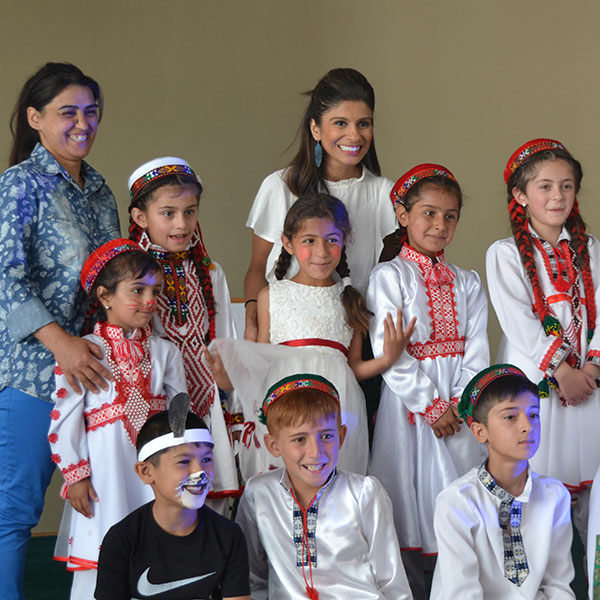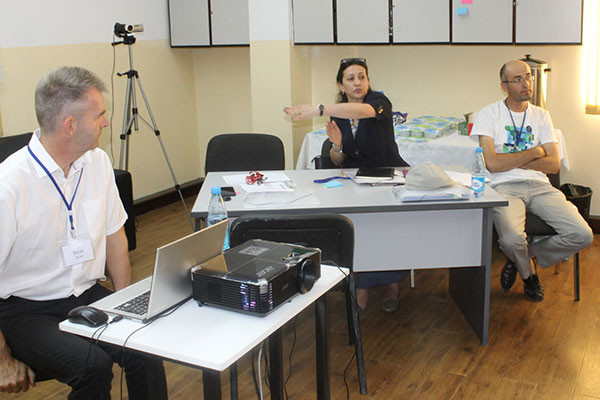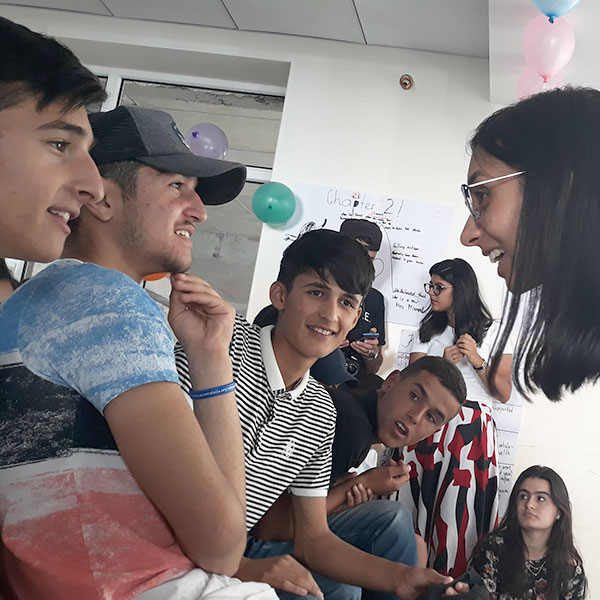
"The Aga Khan Education Services, a philanthropic agency, will draw on its own extensive experience in many parts of the world to offer broad, holistic, early childhood education on a secular and non-denominational basis at the highest standards of excellence. The objective is to have a curriculum of proven calibre, taught by competent teachers, to help lay strong foundations for a child's continuing educational growth."
His Highness the Aga Khan
The Ismaili Centre Dubai, 2003
The Aga Khan Lycée (AKL) in Khorog, was established on the premises of the former School #3 (named after Kirov), a school with a distinguished history in Gorno Badakhshan Autonomous Oblast (GBAO).
The majority of students are from Khorog, with some from more remote districts of GBAO, Tajikistan, and only a few students from other countries.
The staff at Aga Khan Lycée (AKL), like other Aga Khan Schools around the world, strives to create a positive and productive environment that enables over 1,200 students to balance academic demands, extra-curricular activities as well as community life. Teachers challenge students to be intellectually inquisitive and socially conscious. The Lycée believes that it is essential for students to both acquire knowledge and develop their capacity for critical inquiry.
AKL has been implementing diverse educational programming since 2017 to improve school facilities and curriculum delivery and create safe and conducive learning environments for students to learn and develop. Collaboration with the Aga Khan Education Boards in the UK, USA and Canada, and the Aga Khan Youth and Sports Board in Canada enables for sharing of diverse expertise, thereby providing professional development opportunities for AKL teachers. Examples of these programmes include the introduction of STEM activities such as Robotics, Maker’s Lab and Coding Clubs, along with the delivery of summer and winter upgrading programs for students to maximize their opportunities for admission to institutions of higher learning.
In order to develop student’s leadership and other life skills, AKL organizes summer camps for approximately 100 students, including those from other government schools.
Creating conducive learning environments for students is an important aspect of the AKL school. The AKL building has recently been retrofitted and renovated to meeting the standards of 21st century schools. The science labs have been upgraded and equipped providing opportunities for children to do various experiments and benefit from practical learning.
The Aga Khan Lycée Early Childhood Development Centre launched in 2018 and serves over 200 three to six-year-old students annually, supporting them to develop holistically by immersing them in an enjoyable, and child friendly learning environment.
Parents continue to show a keen interest in all AKL and ECD matters, including student events, activities, the improvement of curriculum standards as well as the services and resources available to students. Parents are invited to audit classes and to provide feedback on what they observe.

The Aga Khan Lycée (AKL), Khorog, part of the Aga Khan Education Service, Tajikistan (AKES, Tj) was established in September 1998. His Excellency Emomali Rahmon, the President of the Republic of Tajikistan, inaugurated the School with His Highness the Aga Khan.
The Lycée is built on the premises of the former School #3 (named after Kirov), a school with a distinguished history in Gorno Badakhshan Autonomous Oblast (GBAO). When the Lycée was established, a majority of School #3's teachers, staff and students continued on.
The Aga Khan Lycee is part of the Aga Khan Education Services (AKES). It has a long tradition of leadership in educational development. The foundations of the present education system were laid by Sir Sultan Mahomed Shah Aga Khan III, who established over 200 schools during the 20th century. The first schools were established around 1905 in Zanzibar, Gwadar (Pakistan), Dar es Salaam (Tanzania) and Mundra (India). Since the creation of Aga Khan Education Service companies in the 1970s, the schools have been centrally administered and managed.
AKES currently operates more than 200 schools and several educational programmes that provide quality pre-school, primary, secondary and higher secondary education services to more than 75,000 students in Pakistan, India, Bangladesh, Kenya, Uganda, Tanzania, Kyrgyz Republic, Tajikistan, United Arab Emirates and Madagascar. Schools will also be developed in Afghanistan and the Democratic Republic of Congo.

The Aga Khan Schools challenge its students to be intellectually inquisitive and socially conscious.
Developing skills in critical thinking and analysis, creativity and problem-solving, communication and collaboration are at the core of the school's mission. The School also encourages students to respect and appreciate other people’s cultures, social structures, values and beliefs. Taken together, these approaches develop the tools and nurture the disposition that students will need to be successful through their schooling, in the societies they choose to live, and in an increasingly interdependent world.
The Aga Khan Lycee is dedicated to the development of pre-primary education for all children. The Early Childhood Development Program at AKL currently enrolls over 200 children of ages 3 to 6 years, in a half and full day programme. It focuses on best researched practices to nurture a caring and stimulating environment for children of pre-primary age, including supporting the use of mother tongue, as well as, Tajik, Russian and English languages.
AKL and AKES, Tajikistan work closely with its sister-AKDN agencies, such as the Aga Khan Foundation and the Aga Khan Health Services, and partners with the regional government of GBAO, to support pre-primary quality education access from birth to six years, through various direct and indirect provision models. These include AKES pre-primary to Grade 11 schools, AKES kindergartens, as well as government-based ECD centres within Government Schools, government kindergartens, remote rural Government ECD programmes, and Care for Child Development Programme. Indirect support includes, ECD teacher training, working with pre-natal and post-natal maternal health programmes, providing learning resources, and renovating classrooms.
AKES is a locally registered public foundation in Tajikistan, that actively participates in the direct provision of quality education of children aged 3 to 18 years, facilitating the professional development of teachers through in-service training, working collaboratively with AKDN sister-agencies and government education institutions to support quality access in remote and rural areas, and providing merit scholarships to students from diverse and marginalized backgrounds.
It began its operations under the auspices of the Aga Khan Education Fund in 1997. The Fund's goal was to improve the teaching of English language and Market Economics at institutions of higher learning in Tajikistan and the Kyrgyz Republic.
Past notable activities included, several teacher training opportunities in the United Kingdom, and the establishment of model schools in the province's capital, Khorog, and in Osh in the neighboring Kyrgyz Republic, by AKES, Kyrgyz Republic, to serve as regional centres of excellence.
Through the partnerships with the Aga Khan University’s Institute for Educational Development, several AKL teachers received further training and development workshops, in the areas of science, mathematics, economics, English language and technology.
AKES, Tajikistan also collaborated with ten government schools in the GBAO districts. This collaboration, known as the Allied Schools Project, included School leadership and teacher professional development, facility refurbishment and the provision of basic equipment and resources. It aimed to improve the quality of education in these schools, and build linkages with the Aga Khan Lycée and the government schools in the region.
From 2013 onwards, this outreach work with Government Schools in GBAO continues through the Learning Support Programme (LSP).

This programme, initially developed by the University of Central Asia’s School of Professional and Continuing Education (SPCE), includes the teaching of English language, ICDL technology certificate, and Mathematics, to students in grades 7 – 11, as an afterschool tutorial programme in rural Secondary Government Schools of GBAO. Each of the courses are approximately 6-months long and have either internal or external assessments based on the curriculum being followed, and consists entirely of face-to-face sessions taught by the teacher.
Currently the programme covers 10 secondary schools and 450+ students, including working directly to train and provide resources for more than 30 teachers.
The LSP offers more than 70 hours of professional development to teachers annually. Training sessions are facilitated by AKL faculty and others experts, and are intended to be a peer-to-peer professional development platform that aims to:
i. foster an open and reflective classroom culture.
ii. provide teachers with an opportunity to collaborate and network with colleagues within and outside of GBAO,
iii. demonstrate and receive feedback on different pedagogical approaches in respective subject areas, and
iv. encourage teachers to share their classroom practice through micro-teaching sessions.
Starting from 2021 the Programme was transferred to UCA SPCE as part of their expansion strategy to provide learning support in rural areas of GBAO.

The Aga Khan Lycée has benefited from several unique partnerships and associations that have been formed with leading academic institutions, including institutions in North America, Europe, Africa and Asia. The opportunity of volunteers, who are experts in their own domain, has also tremendously benefited AKL and AKES, TJ.
These partnerships contribute to the quality of the curriculum and to the professional development programmes, thereby, ensuring that our schools strive to offer education at the highest international standards.
Other former initiatives also included workshops on teaching about HIV/AIDS, integration of technology into the classroom and the teaching of English through theatre arts.

© Aga Khan Schools 2009 - All rights reserved
Terms & Conditions | Privacy Policy
The Aga Khan Schools are part of the Aga Khan Education Services,
an agency of the Aga Khan Development Network
© Aga Khan Schools 2009 - All rights reserved | Terms & Conditions | Privacy Policy
The Aga Khan Schools are part of the Aga Khan Education Services,
an agency of the Aga Khan Development Network